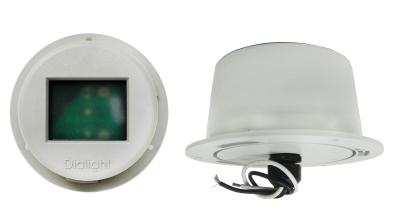
Dialight launched enterprise software called DACS, the Dialight Architecture Control System, control platform that allows for commissioning, grouping and scheduling of the lights and sensors to control, monitor and manage lighting at the fixture, zone, facility and enterprise-wide level with a simple and secure dashboard interface. The system pairs with the company’s new automated demand response system (ADR) and wireless daylight harvesting sensors.
“There is no question this is the most robust, yet simple to use, lighting control system in the world, giving companies complete command over their entire lighting infrastructure from anywhere,” said Michael Sutsko, Dialight’s group chief executive. “The centralized solution saves time and money, allowing facility managers to adjust lighting without having to manually configure each fixture or gateway. Now they can control hundreds of fixtures across an entire facility with just a few clicks. And, it opens the door to even more money-saving opportunities, like our new plug-and-play wireless occupancy sensors and automated demand response system.”
The DACS device-to-enterprise software provides a plug-and-play system that enables cloud-based access and precise control over fixture-level output to monitor and adjust settings on every gateway, sensor and device in every zone, across an entire facility or corporate network. Users can access the DACS dashboard using any computer, tablet or smartphone to see system-wide or fixture-level status, view lighting performance data and set up schedules and rules for any light, device or zone anywhere in the network. Users can even configure instant notifications to receive alerts via email or SMS text for critical fixture or group failures and other events.
With DACS’s built-in ADR system, companies can take advantage of utility provider incentives for participation in demand response programs by configuring DACS to automatically adjust fixture output to lower consumption during peak demand with minimal impact on operations or productivity.
The system uses the OpenADR 2.0 standard, allowing facilities to pre-negotiate load-shedding terms with utility providers and adjust lighting to Level I, II and III forced reduction demands automatically. For example, customers can choose to dim all lights by 20 percent to meet Level I demand, turn off every third light in a zone to meet Level II, or shut down every light in an unoccupied area, if necessary, for Level III. The adjustments happen automatically, and configurations are completely customizable through the DACS dashboard to ensure forced demand response compliance with minimal impact on facility operations and production.
“This is the ultimate in smart lighting technology, giving customers unprecedented flexibility, control and ease of use, while also helping them to save money and earn incentives in the process,” Sutsko said.
As part of its growing line of advanced lighting controls, Dialight says its new wireless daylight harvesting sensor is the first automatic, dynamic light controller of its kind that adjusts LED lighting output based on measured available daylight to help eliminate energy waste while maximizing visibility and flexibility.
Now, customers no longer have to leave the lights burning during peak daylight hours when natural light is available. The AC-powered system dynamically adjusts to changing ambient daylight to dim and brighten lights based on user-selectable lumen levels to reduce energy use and cost while maintaining desired footcandles on the floor. Customers can fine tune the lighting level to meet their needs for each application or specific location.
Unlike conventional wired sensors that must be connected directly to the controlled fixture, the Dialight sensors are equipped with 2.4 GHz IEEE 802.15.4 wireless mesh networking. This allows sensors to be placed anywhere to harvest ambient light as desired, while controlling individual fixtures or groups of lights. For example, sensors can be placed near a door or window to dim one or more interior lights during times of abundant sunshine, brighten to medium output during cloud cover and bring the lights to full output during nighttime hours. Multiple sensors can be deployed across a zone to achieve the most precise measurement and control with plug-and-play integration into DACS.
